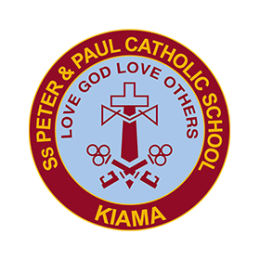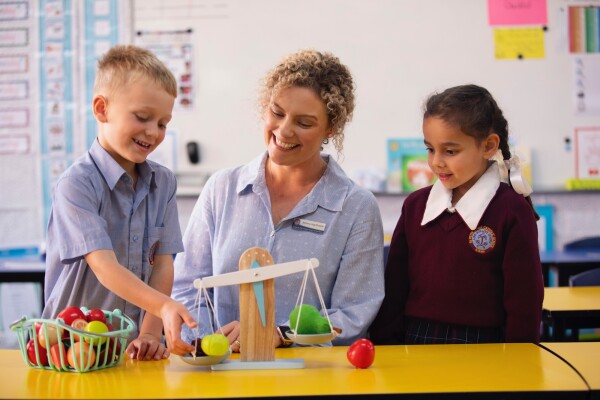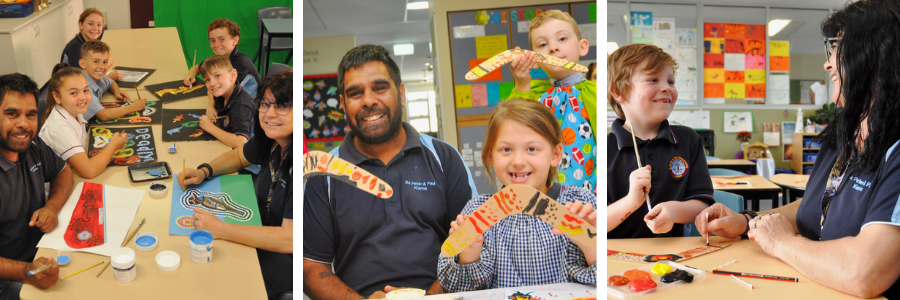
Ss Peter & Paul Kiama
A Catholic Parish Primary School
 At Ss Peter and Paul Catholic Primary School, Kiama, we provide an integrated course schedule of learning through exploration, scrutiny, and self-reflection. In every class, our teachers emphasise the strategies and processes involved in learning and self-growth, creating a unique opportunity to prepare our students to live intelligent, thoughtful, and fulfilling lives in a rapidly changing society.
At Ss Peter and Paul Catholic Primary School, Kiama, we provide an integrated course schedule of learning through exploration, scrutiny, and self-reflection. In every class, our teachers emphasise the strategies and processes involved in learning and self-growth, creating a unique opportunity to prepare our students to live intelligent, thoughtful, and fulfilling lives in a rapidly changing society.
We hold firm to the belief that the acquisition of literacy and numeracy skills are the essential foundations for future success. All teaching staff are trained in a synthetic phonics, multi-sensory, explicit teaching approach to literacy, as well the Challenging Maths Tasks pedagogy of Dr Peter Sullivan. Each school day includes literacy and numeracy lessons and activities for all children that are authentic and meaningful.
Our students also participate in creative, innovative and challenging learning experiences in their daily education, empowering them to develop 21st century learning skills such collaboration, problem solving, creativity, communication and critical thinking. We engage children in multi-disciplinary skills-based learning in a real-life context, demonstrating to them that their learning is connected, relevant and can have an impact on the world around them as well as their future selves.
Students are given a wide range of opportunities to work with cutting-edge digital technology to ensure that they equipped with a wide range of skills to effectively incorporate technology into their learning and daily lives and are confident in their application. The children have access to laptop and desktop computers, iPads, and robotics and coding resources. Read more about our Learning Technologies.
Our school also provides specialist teachers in Music, Library, Performing Arts, Choir, Band, Visual Arts and Physical Education to allow our students access to a wide range of curriculum opportunities and the ability and resources to explore varied interests.
STAGE-BASED LEARNING AT Ss PETER AND PAUL
Ss Peter and Paul has multi-aged classrooms in Stages 2 and 3. This strategic decision allows high quality education to be offered to children attending our school. Please click on the links below for answers to some frequently asked questions concerning multi-aged education.
Ss Peter and Paul Catholic Parish Primary School is registered by the NSW Education Standards Authority (NESA) and is subject to its curriculum requirements. NESA sets and monitors quality teaching, learning, assessment and school standards. It is also responsible for developing Kindergarten to Year 12 syllabuses for NSW schools.
The NSW curriculum includes the Key Learning Areas (KLAs) of:
In addition at Ss Peter and Paul, a course in Religious Education is taught in theory and practice.
Each KLA includes syllabuses that are inclusive of the learning needs of all students.
Syllabuses identify:
The primary (K-6) curriculum is organised into four Stages of learning:
|
Early Stage 1 |
Kindergarten |
|
Stage 1 |
Year 1 and Year 2 |
|
Stage 2 |
Year 3 and Year 4 |
|
Stage 3 |
Year 5 and Year 6 |
Most students will be working towards the outcomes for their Stage. Some students will be working towards outcomes that are above or below their Stage.
For more information on the NSW curriculum, visit the NESA website or view NESA's Parent Guide.
Stage-based learning is an arrangement that allows for the equitable use of the school’s resources, both physical and human. The grouping of students is an organisational consideration.
The structure of learning as outlined by NESA (the registering body for our system of schools) is divided into stages.
This system allows children to consolidate their learning over a two-year period. For example:
Cycle A |
Cycle B |
|
Major Focus Narrative Poety Exposition Description |
Major Focus Recount Information Report Discussion Explanation |
|
Minor Focus Recount Information Report Discussion Explanation |
Minor Focus Narrative Poety Exposition Description |
Modelled learning experiences would generally be presented to a mixed ability group to expose children to ideas outside their current thinking and experience. Guided Reading, Reciprocal Reading and Guided Writing groups will be determined by assessment data and will change regularly according to the needs of the students. Independent activities will emanate from these experiences. Content may be literature or other KLA based. Spelling and Comprehension will continue to remain as focus areas for development in the school.
Mathematics would have all children learning the same strand. Number sense would be to a mixed ability group so as to expose and reinforce students to efficient practices. There is flexibility in that explicitly teaching the concept could also be done to the mixed ability whole class group or to students from across the stage who are grouped (from assessment data) into similar position on the learning continuum. Students would then be provided with support from the teacher and school support staff as they undertook individual, partner or cooperative group investigations. The sharing of their learning at the end of the Mathematics lesson would also be with the mixed ability class or identified group to draw out and emphasise the learning.
In the afternoon sessions, children have the opportunity to explore Human Society and Its Environment, Science and Technology, Personal Development, Health, and Creative Arts. These would be organised around a two-year cycle and would engage children in rich learning tasks that invite them to ponder and learn about people and the world. These may be integrated units of works. These would also be implemented to across ability groups. Teachers could use their expertise in organising the learning for the whole stage and model implementation of the strategies for the whole stage group while this would be a professional development opportunity and support role for other staff.
The class groupings are:
Stage 1
2 x classes of Kindergarten
2 x classes of Year 1
2 x classes of Year 2
Stage 2
3 x classes of Years 3 and 4
Stage 3
3 x classes of Year 5
2 x classes of Year 6
However, the number of classes will depend on enrolment figures for each stage.
Class groups will be formed using the same criteria as outlined in the school’s class placement policy. Formation of classes take gender, learning needs and social factors into consideration. Classes will be mixed ability. During Term 4, parents have the opportunity to provide the school with information that provides further background to student placement.
Class groups are formed using the same criteria as outlined in the school’s class placement policy. Formation of classes take gender, learning needs and social factors into consideration. Classes will be mixed ability. During Term 4, parents have the opportunity to provide the school with information that provides further background to student placement.
No. Education in New South Wales is developed around Stages as outlined in the syllabus documents. This means that children work towards the achievement of outcomes over an approximate twenty-month period. It is the achievement of the outcomes rather than a focus on content that drives the curriculum.
Foundation statements provide the summary of knowledge, skills and attitudes that should be demonstrated by students who have achieved the outcomes for that stage. Teachers design activities based on the foundation statements and outcomes that meet the needs of the student at that time. All students are on a continuum of learning.
Through assessment for and assessment of learning children’s needs are identified and groups are formed to address these needs so that they can progress on the learning continuum. This means that within a classroom, groups will be fluid throughout Key Learning Areas as they change according to student’s needs as identified through assessment.
In English and Mathematics, this means that concepts are modelled to children, taught to specific needs of children in guided groups and then given opportunities to apply knowledge, skills, values and attitudes in individual, partner or cooperative group learning experiences.
These literacy and numeracy skills are utilised in Human Society and Its Environment, Science and Technology, Personal Development and Health to explore concepts about people and our world.
Underpinning children’s learning is the ability for them to set goals and plan, take responsibility for their learning, work cooperatively and problem solve.
The success of the education offered at school is not restricted to academic pursuits but also to the development of the whole child. Our aim is that when children leave Ss Peter and Paul, they will exhibit the following qualities:
The following are two resources for further information on stage-based learning:
Aboriginal Education is a key priority at Ss Peter and Paul. Our school is committed to working in partnership with families and community in welcoming Aboriginal and Torres Strait Islander students – supporting them to reach their full potential and to embrace their culture and identity.
Our talented Aboriginal Education Assistants work to inspire, act as role-models and build the educational aspirations, skills and confidence of Aboriginal students in supporting their participation and success in school programs. They work in conjunction with class teachers to ensure Aboriginal and non-Aboriginal students are able to develop Aboriginal cultural knowledge through enrichment activities such as Dance, Music and Visual Srts. Ss Peter and Paul students also love visiting the Aboriginal garden in engaging in Aboriginal Education and cultural awareness experiences.
Ss Peter and Paul Catholic Primary also holds many events throughout the year in support of Aboriginal Education, including NAIDOC Week, Reconciliation Week and Sorry Day.
Read more about our CEDoW Aboriginal and Torres Strait Islander education program.
